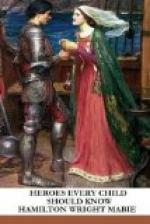Hercules swung the mighty bulk upon his shoulders and proceeded to seek the countryman with whom his pledge stood. So great had been his journey, and so hard his search, that he did not find the good man till the last of the thirty days. There he stood just on the point of offering a sheep to Hercules, supposing him dead. Together they sacrificed the sheep to Zeus instead, and Hercules, vigorous and victorious, bore the mighty lion’s body to Eurystheus at Mycenae.
Entering the place and throwing the carcass down before the king, Hercules so terrified Eurystheus by this token of his wonderful strength that the King forbade him ever again to enter the city. Indeed some say that the terror of Eurystheus was so great that he had a jar or vessel of brass secretly constructed underground which he might use as a safe retreat in case of danger. This “jar” was probably a chamber and its walls covered within with plates of brass. For now in our own day is seen there at Mycenae a room under the earth, and the nails which fastened the brass plates to the wall still remain. Ever after the conquest of this lion Hercules clothed himself with the skin.
THE SECOND LABOUR—DESTROYING THE LERNEAN HYDRA
The second task of Hercules was to destroy a hydra or water snake which dwelt in the marsh of Lerna, a small lake near Mycenae. The body of this snake was large and from its body sprang nine heads. Eight of these heads were mortal, but the ninth head was undying.
Hercules stepped into his chariot and his dear nephew Iolaus, who was permitted by the Delphic priestess to drive for him, took up the reins. The way to Lerna was pleasant. In spring-time crocuses and hyacinths sprang by the roadside, and in early summer the nightingales sang in the olive groves, vineyard and forest. That so great and horrible a monster could be near!
When Hercules and Iolaus came to Lerna they drew close to ground rising near a spring, and Hercules dismounting and searching found the very hole into which the hydra had retired. Into this he shot fiery arrows. The arrows discomforting the snake it crawled forth and, darting at him furiously, endeavoured to twine itself about his legs. The hero began then to wield his mighty club. He crushed head after head upon the snake’s body, but for every one crushed two sprang in its place.
At length the hydra had coiled so firmly round one leg, that Hercules could not move an inch from the spot. And now an enormous crab came from the water out of friendship for the hydra, and that too crept up to Hercules and, seizing his foot, painfully wounded him.
Swinging his club with heroic vigor Hercules beat the crab to death. Then he called to Iolaus to fire a little grove of trees near by. Iolaus at once set the fire, and when the saplings were well aflame he seized them and, standing by the hero, as fast as Hercules cut off a head of the hydra he seared the neck with a flaming brand. The searing prevented the heads from growing again. When all the eight mortal heads had thus been dispatched Hercules struck off the one said to be immortal and buried it in the roadway, setting a heavy stone above. The body of the hydra he cut up and dipped his arrows in the gall, which was so full of poison that the least scratch from such an arrow would bring certain death.




